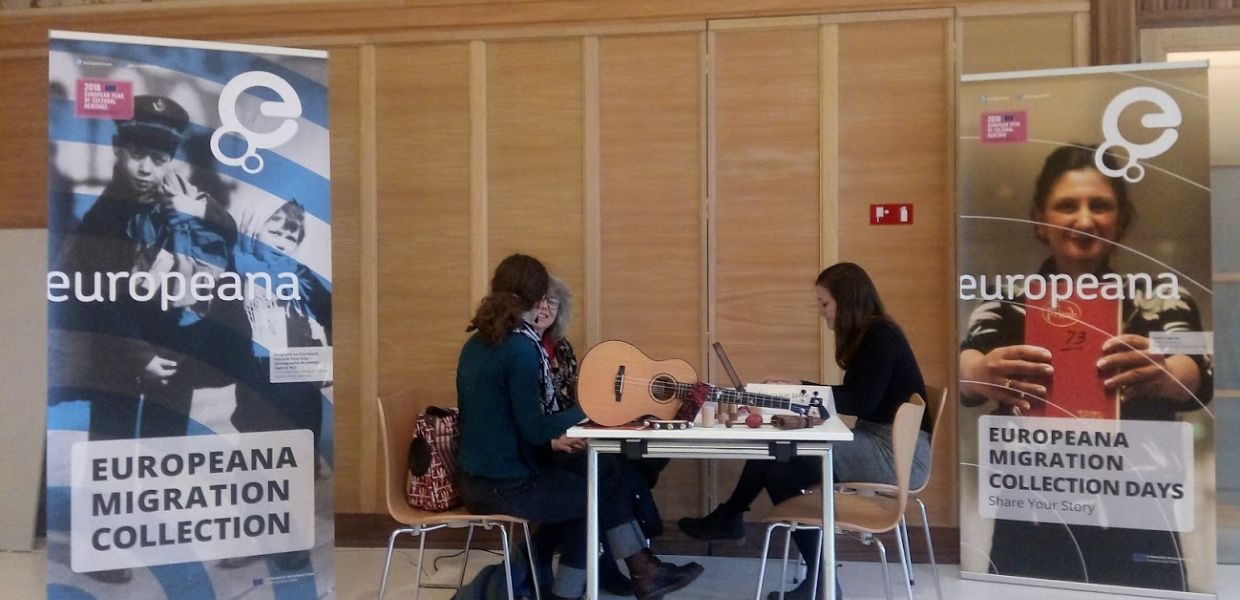Our Migration Collection Days launch
Earlier this month, we launched the Europeana Migration campaign with three collection days at the House of European History in Brussels. Here’s a glimpse at this special event, which will be followed by similar events throughout 2018 all over Europe.

- Title:
- Europeana Migration Collection Launch
- Creator:
- Europeana
- Date:
- 2018
- Institution:
- Europeana
- Country:
- The Netherlands
- Copyright:
- CC BY-SA
In numbers...
Over three days, we collected 51 stories, told by 39 adults and 12 children from the age of six to 80. Their stories included 50 adults and nine children, 35 women and 28 men, from great-great-great-grandfathers to grandchildren. They brought exactly 100 objects, ranging from prayer beads to family trees and even a chair! It wasn’t just the objects we recorded that were diverse, but also the participants’ backgrounds: The participants’ migration stories covered 43 countries in Europe, Africa, Asia, both Americas and Australia - the only continent not covered was Antarctica. We were given stories in five languages and listened to migration motives ranging from political persecution, war and revolution to love, work opportunities and cultural curiosity.
From seashells to songs
In our interviews, we were able to capture the diversity of migration as a human phenomenon. We had stories about historical migration motives, such as Mircea Carp who migrated from the new communist regime in Romania to Washington DC after WWII. Marieke’s story is quite the opposite, she was born in the US and migrated to Brussels together with her husband in 2016 - now she’s working with refugees on songs about their experiences. We listened to stories like Barghav’s, a school kid, who brought a seashell necklace from his hometown Hyderabad, India and is currently living in Brussels with his family - although he has already planned his future as a scientist in the US when he is grown up.
Larissa Borck was one of our interviewers during the three days and she felt enriched after this experience: “‘It was a great pleasure to be able to talk to such a diverse range of people from all around the world. The objects that they brought to be digitised ranged from high commodity valuables to treasures of emotional value. Listening to the stories was precious to me: You get to know people and their histories on a very personal level. Some started to cry, just because it was the first time they had the chance to talk about their migration stories. We should have more moments like these in our daily lives!”’
Positive and participatory
After the event we spoke to Constanze Itzel and Blandine Smilansky from the House of European History to hear their reflections.
Constanze Itzel, Museum Director said, ’We were very pleased to host these Migration Collection Days. Our museum, which assembles objects, documents and testimonies from across Europe has a very similar mission to Europeana. The topic of migration is present in our permanent exhibition, which shows the development of Europe as a continent from which people left, looking for a better life, in the 19th century, while it became a destination many have been trying to reach by all means in the second half of the 20th century. Our exhibitions show how migration has always been part of Europe's history and has shaped its heritage.’
Blandine Smilansky, Events coordinator, said, ‘We were delighted not only with the varied audience that participated, but that visitors to the Museum who were not aware of the event showed a lot of interest, and overall it enriched the experience of the visit for many people, showing how participatory their experience at the museum can be. An example of this was one young French woman who while sharing her family story realised there were things she still didn’t know and explained how this conversation made her want to talk more with her father about her grandparents’ immigration to France in the 1950s’
The event generated press interest from Brussels and Spain, and you can read and listen to the coverage in French, Dutch, Spanish and English in our press round-up.
Get involved
Would you like to get involved in Europeana’s Migration campaign? If your organisation is interested in sharing your migration content as part of the collection, or running a collection day then please contact Adrian Murphy.
Or do you have a migration object and story to tell? Throughout 2018, our partners will host a series of Collection Days all over Europe, or you can contribute to our Migration Collection by sharing your story via our online form.


